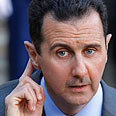
Israel suspected in Assad aide's death
Leaked cable reveals Syria believed Jewish state was behind General Muhammad Suleiman's assassination, but kept quiet due to indirect peace talks held at that time
Syria suspected that Israel was behind the assassination of General Muhammad Suleiman, President Bashar Assad's top security aide and his connection to Hezbollah, who was shot by a sniper in August 2008, according to a leaked documented quoted by The Guardian on Monday night.
Nonetheless, and despite the fact that the Sunday Times reported that Israel was responsible for the assassination, Damascus failed to publicly voice those suspicions.
Suleiman was killed while walking on the beach in the Syrian coastal city of Tartous. A cable sent to the State Department in Washington from the US Embassy in Damascus two days later reported that "Syrian security services quickly cordoned and searched the entire beach neighborhood where the shooting had occurred."
According to the Guardian, Syrian-based journalists were instructed not to report the story. Initial reports were vague about Suleiman's identity and position, but the US government knew exactly who he was.
A confidential document written several months earlier noted that he was "the Syrian special presidential advisor for arms procurement and strategic weapons." Israel reported that he had also served as Assad's link to the Hezbollah organization.
According to foreign reports, 11 months earlier Israeli planes had attacked and destroyed a suspected Syrian nuclear site at al-Kibar on the Euphrates river, apparently one of the special projects Suleiman managed "which may have been unknown to the broader Syrian military leadership", the embassy said.
According to the cable, Israel was "the most obvious suspects" in the assassination. .
"Syrian security services are well aware that the coastal city of Tartous would offer easier access to Israeli operatives than would more inland locations such as Damascus. Suleiman was not a highly visible government official, and the use of a sniper suggests the assassin could visually identify Suleiman from a distance."
3 reasons to remain silent
The embassy speculated that the Syrian government remained silent after the assassination for three reasons: "(1) they may not know who did it; (2) such accusations could impair or end Syria's nascent peace negotiations with Israel; and (3) publicizing the event would reveal yet another lapse in Syria's vaunted security apparatus."
A cable written 10 days later said the assassination had become "a frequent source of controversy" in internal Syrian government deliberations. "Tempers flared during an August 12 higher policy council meeting when high-level security service officials openly questioned the government's continuation of indirect negotiations with Israel and its 'generosity' with Lebanon."
According to the Guardian, Security chiefs claimed that Syria would make concessions and not receive any tangible gains from engaging Lebanon or talking indirectly to Israel.
"Underlying this tense exchange was frustration within the security services that the (Syrian government) was all but ignoring the assassination of Suleiman. Security service officials were suggesting that 'if the Israelis did it' (killed Suleiman), why was the Syrian government continuing the dialogue?" the embassy source added. "'And if it was an inside job, people are wondering about their future.'"
Assad was thus under increasing pressure to provide assurances to his security chiefs about their positions and about the government's intention not to make premature concessions, the Guardian reported.
According to the report, embassy cables also showed that the US had previously wanted to apply financial sanctions to Suleiman as part of an effort to weaken the Assad regime, but found it difficult to do so because the information about him was so highly classified it could not be made public.
"Muhammad Suleiman is a relatively low-payoff target," diplomats reported back to Washington. "His activities are not widely known, which will make it difficult to obtain unclassified information for a public statement and, likewise, make it unlikely that his designation would resonate inside Syria."
- Follow Ynetnews on Facebook










